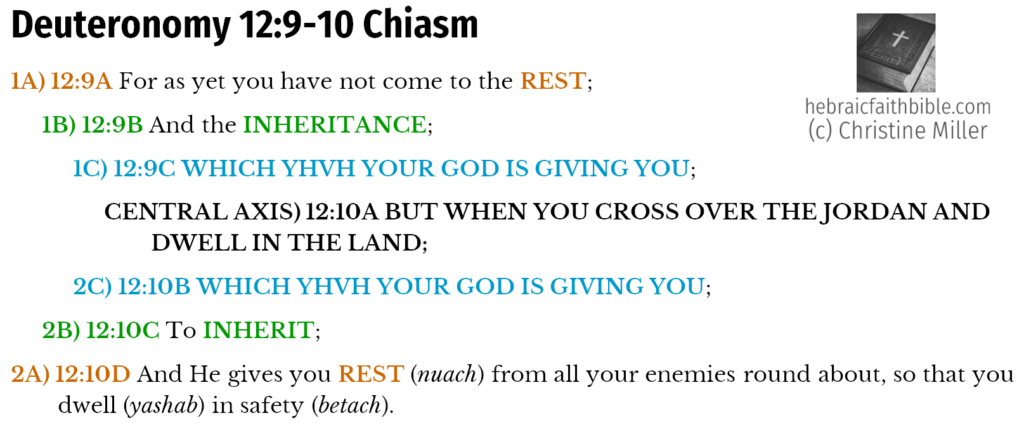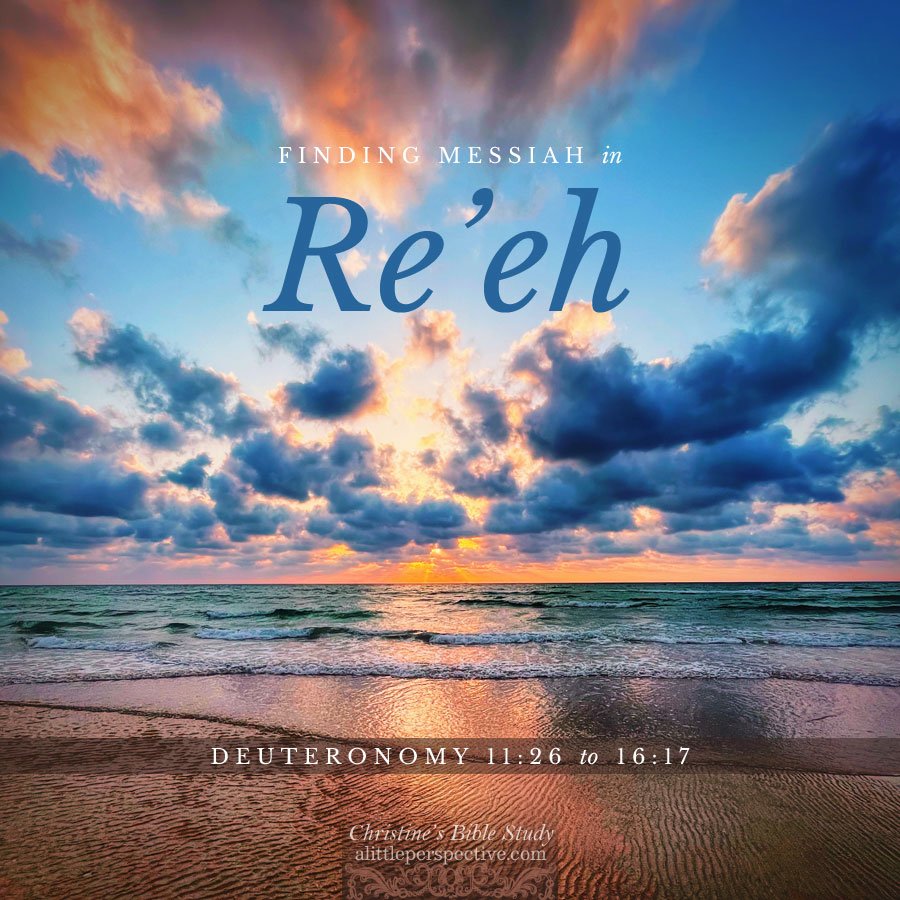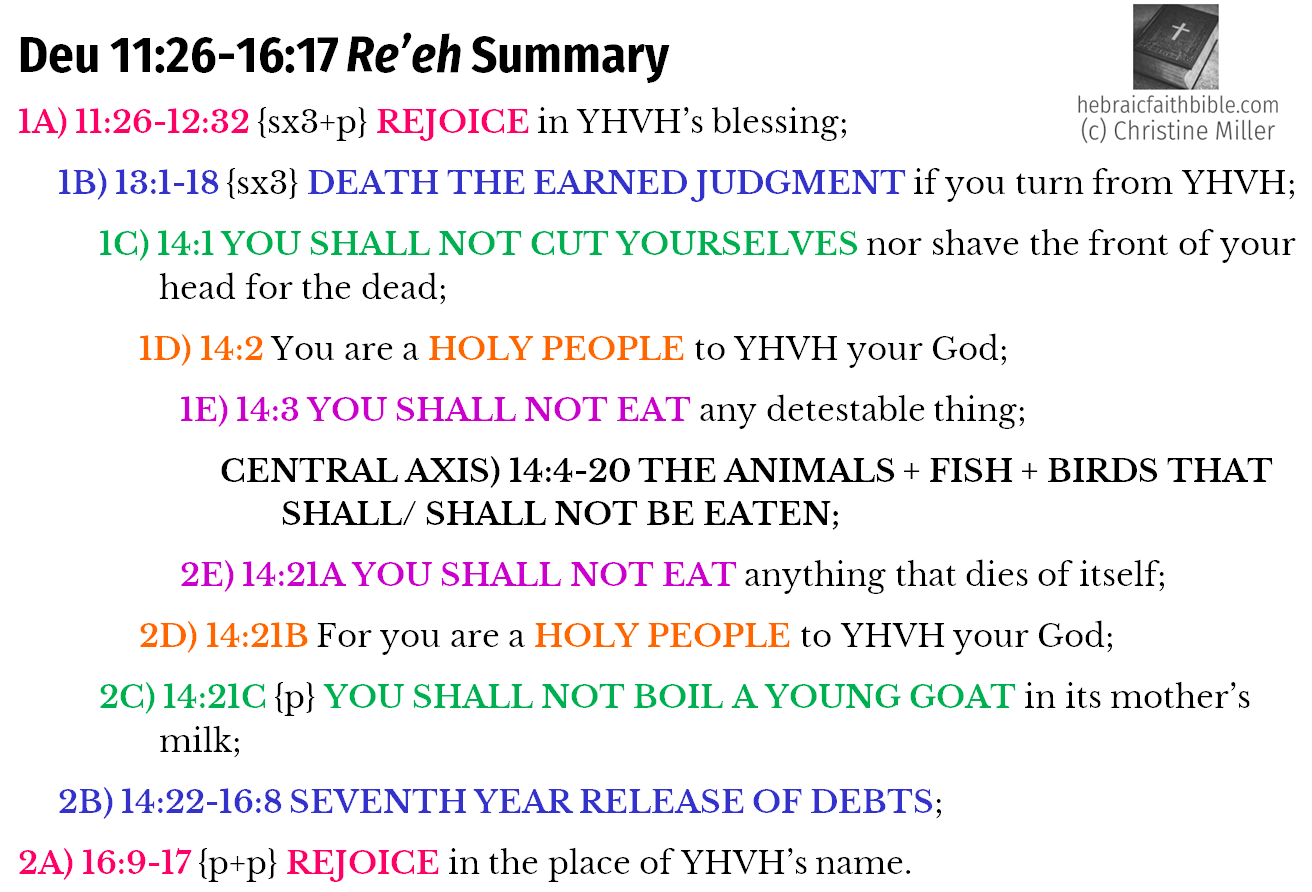Deu 11:26-12:19
Hebrew paragraph divisions:
11:26-28 {s} Blessing for obedience/ curse for disobedience
11:29-12:19 {s} Israel shall worship YHVH in the way He commands
For you are not as yet come to the rest and to the inheritance which YHVH your God is giving you. But when you go over the Jordan, and dwell in the land which YHVH your God is giving you to inherit, and when He gives you rest from all your enemies round about, so that you dwell in safety … Deu 12:9-10
This passage makes a chiastic structure, with a central axis highlighting crossing over the Jordan to dwell in the Land.

We have already seen that it is a prophetic metaphor for entering the promise of eternal life in Messiah. When we cross into our inheritance, He gives us rest from our enemies, so that we dwell in safety.
“Rest,” Strong’s H4496, menuchah, is a concrete noun meaning, “a resting place,” from Strong’s H5117, nuach, a primitive root meaning, “to rest.” The pictographs are nun + vav + chet.
nun נ ן = seed, thus continue, heir, son
vav ו = tent peg, thus add, secure, hook
chet ח = the wall, thus outside, divide, half
The parable being told is of continuing (nun) securely (vav) outside (chet). There are two possible explanations. “Outside” is beyond the tent wall wherein the family dwells, or the enclosure fence, wherein the tribe dwells. Within the tent walls and within the enclosure fence, the family and the tribe is secure. But to also be secure beyond the tent wall and beyond the enclosure fence, that is true security indeed.
And the second, suggested by the Ancient Hebrew Lexicon, is that it is beyond the enclosure fence that the shepherd leads his flock to a place of green pasture and still water, where he makes them lie down in safety.
Rest from our enemies is defined as the place of green pasture and still water, to which the Good Shepherd leads us, His flock.
“To dwell” is in Hebrew, Strong’s H3427, ישב yashab, a primitive root meaning, “to sit down.” The pictographs are yud + shin + bet.
yud י = closed hand, thus work, throw, worship
shin ש = two front teeth, thus sharp, press, eat, two, again
bet ב = house, thus house, household, family, in, within
The parable tells that when work (yud) is ended, we press (shin) into the house (bet), to sit down at the end of our day of labor. Again, the idea of ceasing from labor and the work of our hands.
“Safety” is in Hebrew, Strong’s H983 betach, an abstract concept meaning, “security,” from Strong’s H982, בטח batach, a primitive root meaning, “to trust.” The pictographs are bet + tet + chet.
bet ב = house, thus house, household, family, in, within
tet ט = basket, thus surround, contain, hold, mud
chet ח = wall, thus outside, divide, half
The parable being told is of the family (bet) surrounded by (tet) the wall (chet). The abstract concept from this verbal root is security, because the family is secure within its house. This same verb is found over and over again all throughout the Hebrew Bible, to mean trusting in YHVH for salvation. This is the Gospel of Grace in Messiah Yeshua, not new, but true.
But I have trusted in Your mercy; my heart shall rejoice in Your salvation. Psa 13:5
Trust in Him at all times; you people, pour out your heart before Him: God is a refuge for us. Selah. Psa 62:8
They that trust in YHVH shall be as mount Zion, which cannot be removed, but abides for ever. Psa 125:1
Behold, God is my salvation; I will trust, and not be afraid: for YHVH YEHOVAH is my strength and my song; He also is become my salvation. Isa 12:2
Deu 12:20-14:2
12:20-28 {s} Israel shall worship YHVH in the way He commands, even when they must travel some distance to His place
12:29-32 {p} Israel shall not serve YHVH as the nations
13:1-5 {s} Death for the prophet who tries to turn Israel from YHVH
13:6-11 {s} Death for the loved one who tries to turn Israel from YHVH
13:12-18 {s} Death for the city in Israel who turns from YHVH
14:1-2 {s} Do not mourn for the dead in the manner of the nations
And none of the accursed things shall cleave to your hand, that YHVH may turn from the fierceness of His anger, and show you mercy, have compassion upon you, and multiply you, as He has sworn unto your fathers. Deu 13:17
The fierceness of YHVH’s anger is reserved for the accursed thing.
Yet it pleased YHVH to bruise Him; He has put Him to grief. When You shall make His soul an offering for sin, He shall see His seed, He shall prolong His days, and the pleasure of YHVH shall prosper in His hand. Isa 53:10
It pleased YHVH to crush Messiah. When Yeshua was on the cross, accursed, He drank the cup of YHVH’s wrath, and so turned His fierce anger away from Israel, so that YHVH could show us mercy and compassion, as at this day.
And He went a little further, and fell on His face, and prayed, saying, “O My Father, if it be possible, let this cup pass from Me. Nevertheless not as I will, but as You will.“ Mat 26:39
It was the cup of God’s wrath that Yeshua asked to pass from Him in the Garden, because YHVH’s wrath against sin is fierce.
Deu 14:3-29
14:3-8 {s} Do not eat unclean animals
14:9-10 {s} Do not eat unclean sea creatures
14:11-21 {p} Do not eat unclean flying things/ do not boil a kid in its mother’s milk
14:22-27 {s} Annual tithe is YHVH’s
14:28-29 {s} Tithe of the third year is YHVH’s
You shall not eat anything that dies of itself; you shall give it unto the stranger who is within your gates, that he may eat it, or you may sell it unto a foreigner; for you are a holy people unto YHVH your God. You shall not boil a kid in his mother’s milk. Deu 14:21
This verse prophesies of Messiah Yeshua in an amazing way. What does it mean to be a holy people to YHVH our God? We have an idea that “to be holy” means “to be sinless.” The Lexicons say it means “to be set apart,” that is, not the same as the world. But the Hebrew root word parable tells an even more wonderful story.
“Holy” is in Hebrew, Strong’s H6918, qadowsh, an adjective meaning, “holy;” from Strong’s H6942, קדש qadash, a primitive root meaning, “to be holy.” Its first letter is a quph, but according to The Ancient Hebrew Lexicon, the quph was transposed from an original chet, making the pictographs, chet + dalet + shin.
chet ח = wall, thus outside, divide, half
dalet ד = door, thus enter, move, hang
shin ש = two front teeth, thus sharp, press, eat, two, again
The parable being told is of a wall making a separation (chet) between two parties. When one comes through the wall via its door (dalet), the two parties (shin) can be joined together.
There is a wall separating YHVH God, and His people, from the idols of the nations, and the idolaters of the nations, and the idolatrous practices of the nations. That is what “to be set apart” means. But there is a Door in the wall.
Then Yeshua said unto them again, “Truly, truly, I say unto you, I AM the Door of the sheep. All that ever came before Me are thieves and robbers: but the sheep did not hear them. I AM the Door: if any man enter in by Me, he shall be saved, and shall go in and out, and find pasture.” Joh 10:7-9
When someone on the other side of that wall, who is on the side with the nations and the world, comes in through the Door, then that one is joined to the congregation of the Living God. Therefore “to be holy” fundamentally means “to be joined to the congregation of the Living God.” It is not so much a performance word as it is an identity word. Of course, out of that identity in Him, flows walking in His same ways and doing His same works. Identity, and walking and working, are intrinsically attached, and is why Yeshua said,
“You shall know them by their fruits.” Yeshua, Mat 7:16
Deu 15:1-16:17
15:1-6 {s} Seventh (Sabbath) year release of debts
15:7-11 {s} Lend generously to the poor even when the Sabbath year approaches
15:12-18 {p} Seventh (Sabbath) year release of servants
15:19-23 {p} Firstborn are holy to YHVH
16:1-8 {s} Passover is holy to YHVH
16:9-12 {p} Weeks is holy to YHVH
16:13-17 {s} Tabernacles is holy to YHVH
Three times a year all your males shall appear before YHVH your God in the place which He chooses: at the Feast of Unleavened Bread, at the Feast of Weeks, and at the Feast of Tabernacles; and they shall not appear before YHVH empty-handed. Deu 16:16
Three is pointing us to Messiah. In fact, Messiah fulfilled Passover when He was crucified on Passover; He fulfilled the Firstfruits of the Barley Harvest, celebrated during Unleavened Bread, when He was raised from the dead with new life on that day. He is the Unleavened Bread, by the way—the Bread from Heaven which is without leaven, or sin.
Messiah fulfilled Weeks when He baptized the believers with the Holy Spirit and with fire on the day of the Feast of Weeks (Pentecost in Greek). And He will fulfill Tabernacles at His second coming.
That none are to appear empty-handed, refers to the fact that these three are harvest feasts. The Firstfruits of Barley always falls during the week of Unleavened Bread. Passover, Unleavened Bread, and Firstfruits, since they always fall in the same week, are often known simply as Unleavened Bread. During Unleavened Bread, a firstfruits offering of the barley harvest is brought to YHVH. At Weeks, a firstfruits offering of the wheat harvest is brought to YHVH. And at Tabernacles, a firstfruits offering of the fruits harvest is brought to YHVH. This is also prophetic, as harvest is a metaphor for salvation in the New Testament, and Messiah is the firstfruits of the resurrection from the dead.
There is a second prophecy of Messiah Yeshua and the Gospel of grace in this section. To see it, let’s look at the complete chiastic structure for the Re’eh Torah portion:
The matching B pairs read:
1B) 13:1-18 {sx3} DEATH THE EARNED JUDGMENT if you turn from YHVH;
2B) 14:22-16:8 SEVENTH YEAR RELEASE OF DEBTS.
They do not appear to match at first glance, do they? They are forced together by the surrounding elements, of which there can be no doubt. But that is often how Torah prophesies of Messiah and the gospel of grace. Beloved, we have earned the judgment of death for ourselves by our sin. But YHVH has provided a Jubilee for our debt and bondage to sin in Messiah Yeshua.
DEUTERONOMY 11:26-16:17 ANNUAL RE’EH “SEE” OUTLINE | DEUTERONOMY in CHIASTIC STRUCTURE
FINDING MESSIAH in TORAH: A MESSIANIC DISCOVERY THROUGH the TORAH PORTIONS
THE LAW of LOVE: THE GOSPEL of GRACE REVEALED in the COMMANDMENTS OF GOD


















Leave a Reply